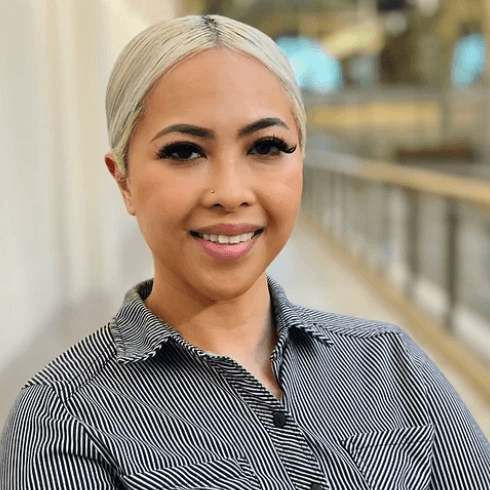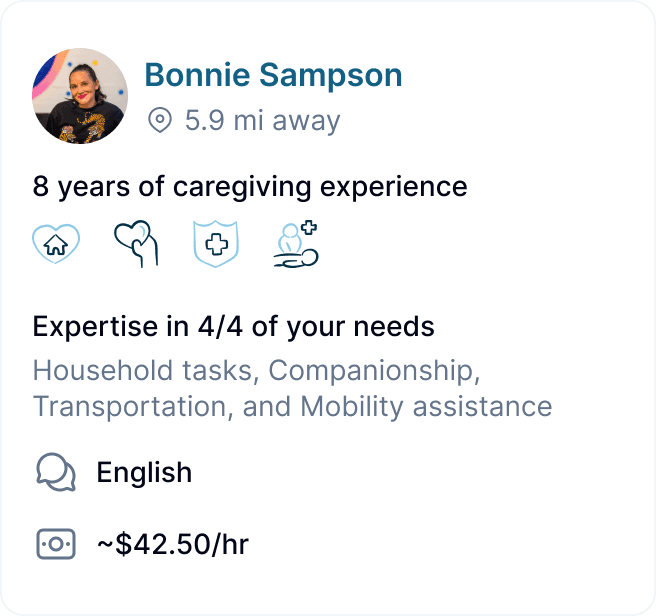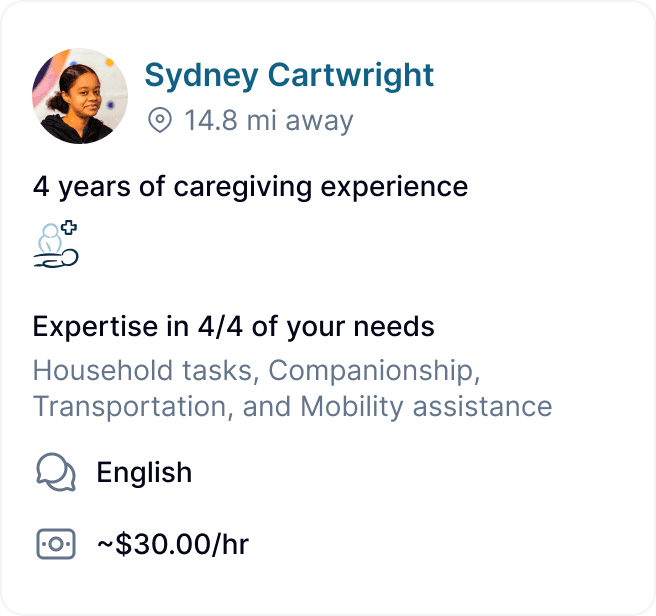Interviewing Caregivers: Building Trust from Hello
Dec 13, 2024
Dec 13, 2024



Finding the right caregiver for yourself or a loved one is a big deal. After all, this person will play a critical role in daily life, providing care, comfort, and companionship.
But how do you ensure you’re selecting someone who is not only qualified, but also the right fit for your family? At Clara, we take care of every step – from helping you find potential caregivers to handling payroll and taxes for your in-home aide – so you can focus on finding the best care for your loved ones.
Once you've matched with a caregiver, it's important to conduct an interview to ensure they meet your specific needs. This guide will walk you through the process of interviewing a caregiver and setting the foundation for a successful relationship.
Before the Interview
Prepare Your Questions
Start by making a list of questions that are important to you. These should cover both the caregiver’s experience and how they approach the work. It helps to have a clear idea of the qualities and skills you're seeking in a caregiver.
If you’re not sure about what qualities and skills you’re looking for in a caregiver, Clara’s care advisors are able to help!
Choose a Comfortable, Neutral Location
If you’re meeting in person, pick a quiet, neutral space like your living room. A comfortable environment encourages open conversation and helps both parties feel at ease.
Start with Small Talk
Don’t dive straight into the heavy questions. Start with some light conversation to break the ice. This sets a friendly tone for the interview and allows you to get a sense of the caregiver’s demeanor and personability.
Ask About Experience and Skills
Understanding a caregiver’s qualifications is essential. You’ll want to know if they have the expertise and experience to handle the specific needs of your loved one – you can read more about the 11 types of care here. Consider asking:
What experience do you have with caregiving, and how long have you been in this field?
Have you worked with someone who has [specific condition or need] before?
Can you describe a challenging situation you faced as a caregiver and how you handled it?
While their answers are important, pay attention to how they respond, too. Are they empathetic? Confident in their abilities?
Gauge Personality Fit
While skills are important, a caregiver’s personality is also critical. Since they’ll be spending a lot of time with your loved one, you want someone who not only understands the practical aspects of care but also connects on a personal level. Ask questions like:
What do you enjoy most about caregiving?
How do you typically build trust with the people you care for?
What would you do if my loved one is having a difficult day emotionally?
A good caregiver should show warmth, patience, and an ability to bond with those they care for. Trust your instincts when it comes to how they make you and your loved one feel.
Cover Logistics
Before wrapping up the interview, be upfront about your expectations. Clarifying logistics ensures that both you and the caregiver are on the same page:
Are you comfortable with the hours and schedule required for this position?
Do you have reliable transportation to get to and from the job?
What is your policy on last-minute changes or emergency situations?
Being transparent about these details will prevent misunderstandings down the line.
Next Steps
If the interview goes well and you’re ready to move forward, consider setting up a trial period. This gives everyone a chance to see how things work in real life. During the trial, keep communication open: provide feedback and have regular check-ins with your caregiver and loved one to make sure they are both happy!
Conclusion
Finding the right caregiver is about more than just checking off qualifications - it’s about choosing someone who will connect with your loved one and become a trusted part of your family’s life. By preparing thoughtful questions, creating a relaxed interview setting, and focusing on both skills and personality, you can find a caregiver who fits your unique needs. A well-conducted interview not only helps you make the right choice but also sets the stage for a strong, lasting relationship built on trust and understanding.
Finding the right caregiver for yourself or a loved one is a big deal. After all, this person will play a critical role in daily life, providing care, comfort, and companionship.
But how do you ensure you’re selecting someone who is not only qualified, but also the right fit for your family? At Clara, we take care of every step – from helping you find potential caregivers to handling payroll and taxes for your in-home aide – so you can focus on finding the best care for your loved ones.
Once you've matched with a caregiver, it's important to conduct an interview to ensure they meet your specific needs. This guide will walk you through the process of interviewing a caregiver and setting the foundation for a successful relationship.
Before the Interview
Prepare Your Questions
Start by making a list of questions that are important to you. These should cover both the caregiver’s experience and how they approach the work. It helps to have a clear idea of the qualities and skills you're seeking in a caregiver.
If you’re not sure about what qualities and skills you’re looking for in a caregiver, Clara’s care advisors are able to help!
Choose a Comfortable, Neutral Location
If you’re meeting in person, pick a quiet, neutral space like your living room. A comfortable environment encourages open conversation and helps both parties feel at ease.
Start with Small Talk
Don’t dive straight into the heavy questions. Start with some light conversation to break the ice. This sets a friendly tone for the interview and allows you to get a sense of the caregiver’s demeanor and personability.
Ask About Experience and Skills
Understanding a caregiver’s qualifications is essential. You’ll want to know if they have the expertise and experience to handle the specific needs of your loved one – you can read more about the 11 types of care here. Consider asking:
What experience do you have with caregiving, and how long have you been in this field?
Have you worked with someone who has [specific condition or need] before?
Can you describe a challenging situation you faced as a caregiver and how you handled it?
While their answers are important, pay attention to how they respond, too. Are they empathetic? Confident in their abilities?
Gauge Personality Fit
While skills are important, a caregiver’s personality is also critical. Since they’ll be spending a lot of time with your loved one, you want someone who not only understands the practical aspects of care but also connects on a personal level. Ask questions like:
What do you enjoy most about caregiving?
How do you typically build trust with the people you care for?
What would you do if my loved one is having a difficult day emotionally?
A good caregiver should show warmth, patience, and an ability to bond with those they care for. Trust your instincts when it comes to how they make you and your loved one feel.
Cover Logistics
Before wrapping up the interview, be upfront about your expectations. Clarifying logistics ensures that both you and the caregiver are on the same page:
Are you comfortable with the hours and schedule required for this position?
Do you have reliable transportation to get to and from the job?
What is your policy on last-minute changes or emergency situations?
Being transparent about these details will prevent misunderstandings down the line.
Next Steps
If the interview goes well and you’re ready to move forward, consider setting up a trial period. This gives everyone a chance to see how things work in real life. During the trial, keep communication open: provide feedback and have regular check-ins with your caregiver and loved one to make sure they are both happy!
Conclusion
Finding the right caregiver is about more than just checking off qualifications - it’s about choosing someone who will connect with your loved one and become a trusted part of your family’s life. By preparing thoughtful questions, creating a relaxed interview setting, and focusing on both skills and personality, you can find a caregiver who fits your unique needs. A well-conducted interview not only helps you make the right choice but also sets the stage for a strong, lasting relationship built on trust and understanding.
Finding the right caregiver for yourself or a loved one is a big deal. After all, this person will play a critical role in daily life, providing care, comfort, and companionship.
But how do you ensure you’re selecting someone who is not only qualified, but also the right fit for your family? At Clara, we take care of every step – from helping you find potential caregivers to handling payroll and taxes for your in-home aide – so you can focus on finding the best care for your loved ones.
Once you've matched with a caregiver, it's important to conduct an interview to ensure they meet your specific needs. This guide will walk you through the process of interviewing a caregiver and setting the foundation for a successful relationship.
Before the Interview
Prepare Your Questions
Start by making a list of questions that are important to you. These should cover both the caregiver’s experience and how they approach the work. It helps to have a clear idea of the qualities and skills you're seeking in a caregiver.
If you’re not sure about what qualities and skills you’re looking for in a caregiver, Clara’s care advisors are able to help!
Choose a Comfortable, Neutral Location
If you’re meeting in person, pick a quiet, neutral space like your living room. A comfortable environment encourages open conversation and helps both parties feel at ease.
Start with Small Talk
Don’t dive straight into the heavy questions. Start with some light conversation to break the ice. This sets a friendly tone for the interview and allows you to get a sense of the caregiver’s demeanor and personability.
Ask About Experience and Skills
Understanding a caregiver’s qualifications is essential. You’ll want to know if they have the expertise and experience to handle the specific needs of your loved one – you can read more about the 11 types of care here. Consider asking:
What experience do you have with caregiving, and how long have you been in this field?
Have you worked with someone who has [specific condition or need] before?
Can you describe a challenging situation you faced as a caregiver and how you handled it?
While their answers are important, pay attention to how they respond, too. Are they empathetic? Confident in their abilities?
Gauge Personality Fit
While skills are important, a caregiver’s personality is also critical. Since they’ll be spending a lot of time with your loved one, you want someone who not only understands the practical aspects of care but also connects on a personal level. Ask questions like:
What do you enjoy most about caregiving?
How do you typically build trust with the people you care for?
What would you do if my loved one is having a difficult day emotionally?
A good caregiver should show warmth, patience, and an ability to bond with those they care for. Trust your instincts when it comes to how they make you and your loved one feel.
Cover Logistics
Before wrapping up the interview, be upfront about your expectations. Clarifying logistics ensures that both you and the caregiver are on the same page:
Are you comfortable with the hours and schedule required for this position?
Do you have reliable transportation to get to and from the job?
What is your policy on last-minute changes or emergency situations?
Being transparent about these details will prevent misunderstandings down the line.
Next Steps
If the interview goes well and you’re ready to move forward, consider setting up a trial period. This gives everyone a chance to see how things work in real life. During the trial, keep communication open: provide feedback and have regular check-ins with your caregiver and loved one to make sure they are both happy!
Conclusion
Finding the right caregiver is about more than just checking off qualifications - it’s about choosing someone who will connect with your loved one and become a trusted part of your family’s life. By preparing thoughtful questions, creating a relaxed interview setting, and focusing on both skills and personality, you can find a caregiver who fits your unique needs. A well-conducted interview not only helps you make the right choice but also sets the stage for a strong, lasting relationship built on trust and understanding.
More about finding care
More about finding care


How Do I Find A Reliable Private Caregiver?



Vanessa Bustos


Navigating the Choices: Private In-Home Caregivers vs. Agency Care



Lowrie Hilladakis


Can a Dementia Patient Be Cared for at Home?



Lowrie Hilladakis


The Senior Care Crisis: Strengthening the Caregiving Workfoce



Lowrie Hilladakis


How do I find help for my elderly parent?



Lowrie Hilladakis


What if my caregiver isn't the right fit?



Jon Levinson


What Are the Differences Between a Personal Care Assistant and a Certified Caregiver?



Vanessa Bustos


How Do I Pick the Best Senior Living Option for My Parents?



Vanessa Bustos


4 Signs It Might Be Time To Hire Care For Your Senior Loved One



Vanessa Bustos


Navigating Post-Hospital Care: A Guide



Lowrie Hilladakis
GEt started for free
Better care starts with Clara.
Find, hire, and pay top-notch caregivers without the headache for a price that fits your budget.



GEt started for free
Better care starts with Clara.
Find, hire, and pay top-notch caregivers without the headache for a price that fits your budget.



GEt started for free
Better care starts with Clara.
Find, hire, and pay top-notch caregivers without the headache for a price that fits your budget.

